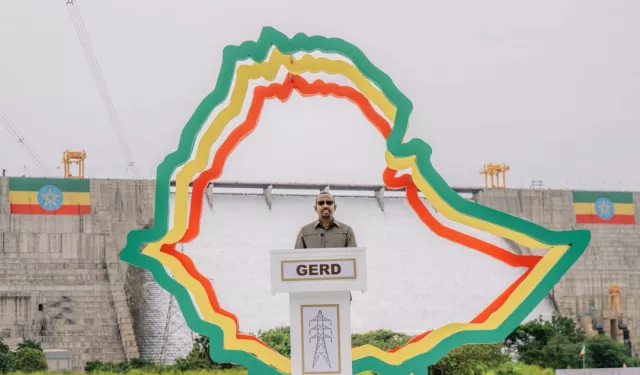
Ethiopia’s GERD inauguration tests the fragile future of the Nile
Ethiopia inaugurated the Grand Ethiopian Renaissance Dam/GERD on the Blue Nile last Tuesday, bringing to an end more than a decade of construction and negotiations, but not the controversy that has surrounded the project since its inception.
For 13 years, Addis Ababa, Cairo, and Khartoum have been engaged in discussions that never yielded a binding legal framework for the filling and operation of what has become Africa’s largest hydropower project. The dam is now operational, but the dispute remains unresolved.
From Addis Ababa’s perspective, the GERD represents a sovereign project of national pride and development, a symbol of Ethiopia’s capacity to mobilize its own resources to meet its energy needs. PM Abiy Ahmed declared that the dam would “never be a threat to downstream countries,” and sought to reassure both Egypt and Sudan that their water security would not be compromised.
Yet Cairo’s reaction was immediate and uncompromising: in a letter to the UN Security Council, Egypt denounced the move as “unilateral” and “contrary to international law,” while reiterating that the Nile remains an existential matter from which it cannot retreat.
Thirteen years of deadlock
Launched in April 2011, with the first filling in 2020 and electricity generation beginning in 2022, the GERD has been the subject of repeated negotiation rounds that consistently failed to bridge the divide between the three riparian states.
In December 2023, Egypt formally declared the negotiation track exhausted, accusing Addis Ababa of intransigence and of imposing a “fait accompli.” Ethiopia, in turn, has long rejected what it calls Cairo’s insistence on “colonial-era agreements” guaranteeing Egypt a fixed water quota, which Addis Ababa considers unjust and out of step with the demographic and developmental realities of the upstream basin states.
The official inauguration, attended by leaders from Kenya, Djibouti, Somalia and South Sudan, was steeped in symbolism.
Abiy Ahmed compared the moment to the 1896 “Victory of Adwa,” when Ethiopian forces defeated Italian colonial troops. But alongside this nationalist rhetoric, he extended an olive branch, affirming that Ethiopia “will not deprive its neighbors of their rights” and calling for joint development projects.
This dual discourse—triumphalist on the one hand, conciliatory on the other—has characterized Ethiopia’s approach to the dam for years, leaving downstream countries uncertain whether to interpret Addis Ababa’s gestures as reassurance or as a strategy of delay.
Egypt’s existential red line
For Egypt, whose dependence on the Nile is absolute with over 98% of its needs supplied by the river, the stakes are existential. President Abdel Fattah El-Sisi has repeatedly framed the issue as one of national survival.
In March 2024, Water Resources Minister Hani Sewilam admitted that the GERD had already had an impact, but stressed that Egypt had managed to adapt “at a cost.” He reminded that the 2015 Declaration of Principles envisages compensation should harm befall downstream states, and warned that Egypt would one day demand this right.
Cairo’s message to the UN Security Council went further: Ethiopia’s unilateral steps, it said, are “null and void,” and any notion that Egypt might acquiesce in such actions is “mere illusion.” By invoking the UN Charter and international law, Cairo signaled that its options remain open—including, implicitly, recourse to force.
Legal and diplomatic concerns
International law experts echo Cairo’s warnings.
Ambassador Mohamed Hegazy told Al Manassa that the inauguration is “a hostile and irresponsible act” with regional consequences. International law professor Mohamed Mehran recalled that the 1997 UN Watercourses Convention prohibits unilateral actions that cause significant harm and obliges states to share rivers equitably. Ambassador Salah Halima, meanwhile, accused Ethiopia of “systematically evading its commitments under the 2015 Declaration of Principles.”
Technical concerns are no less pressing. Egyptian officials, in comments to Al Manassa, warned that the greatest risk lies in prolonged droughts, lasting seven to ten years, during which uncoordinated filling by Ethiopia could deprive Egypt of vital flows. This “man-made drought,” they argued, can only be avoided through a binding mechanism for daily data exchange on releases from the GERD, coupled with a framework for dispute settlement—both absent today.
Cooperation or conflict?
The future of the GERD remains deeply uncertain. Optimists argue that a balanced agreement could transform the dam into a source of cooperation, unlocking opportunities for regional energy integration and development. Pessimists, however, see in Ethiopia’s unilateralism the seeds of conflict, with implications far beyond the Nile basin. The Horn of Africa and the Red Sea corridor, already fragile and strategically vital, could be further destabilized, with repercussions for Gulf security and global trade routes.
Ethiopian negotiator Fekahmed Negash Nuru dismissed Egypt’s demands for a binding agreement as an attempt to “extract recognition” of historic water quotas inherited from the colonial era, a position that underscores the depth of the ideological as well as legal divide.
Cairo, nonetheless, retains significant diplomatic leverage. It can internationalize the dispute further, mobilize support from regional partners such as Saudi Arabia, the United Arab Emirates, and Turkey, and seek renewed mediation by Washington, provided credible guarantees of Ethiopian seriousness are secured.
Some analysts, speaking to Al Manassa, openly evoke Article 51 of the UN Charter, which enshrines the right of self-defense, as a basis for a last-resort military option. Yet, for now, Egypt’s discourse continues to balance between the rhetoric of warning and the language of diplomacy, insisting on peaceful resolution while reminding that “all options remain on the table.”
The inauguration of the GERD thus neither resolves nor closes the dispute. It may, if managed through a binding and equitable agreement, open the way to cooperation and shared development. But in the absence of such an accord, the dam remains a potential trigger for confrontation in one of the world’s most strategically sensitive regions. Between these two paths—cooperation and conflict—the GERD continues to embody both promise and peril, and the crisis remains far from settled.